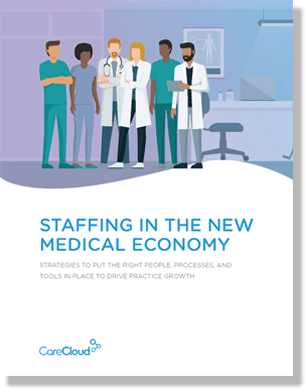Definitions of ‘cloud’ among providers and other members of the healthcare industry differ wildly – not unlike the principles of chaos theory that define weather forecasts.
But here’s a difference. With regards to cloud computing, overcast is best, and the healthcare industry is abnormally sunny.
In recognition of this, Todd Park, U.S. CTO and a pioneer of cloud computing in healthcare, has advanced the HHS’s efforts to migrate much of the government’s health data online for future entrepreneurs to use as pivots for new software applications.
So sure, there’s plenty of hype and it all sounds very enthralling, but the future of the cloud seems a little nebulous. So what does the landscape really look like?
Today’s Forecast
Clinical, administrative, and financial workflows that support healthcare practices have undergone vast changes, transitioning from hard copy to software-based systems in just a few years. Facing ever more security and compliance standards, and with recent government-mandated changes for reporting and reimbursement, healthcare organizations are having to rethink their approach to, and investment in, electronic health records (EHR), practice management platforms, and cloud computing.
Yet, less than one-third of healthcare organizations are turning to the cloud. Many chief information officers and healthcare executives have concerns about data access, privacy, and cost, thinking that medical records kept in-house and under lock and key are a safer bet. However, the IT support needed to efficiently manage EHRs under security and compliance regulations can quickly overwhelm even the most IT-savvy medical practices. And data breaches are becoming more common.
However, with a robust configuration of advanced IT technologies, from software as a service (SaaS) to managed hosting and hardware platforms, medical organizations can benefit in multiple ways from cloud computing.
Impact of New Requirements on Healthcare Operations
From large hospitals and medical groups to smaller community doctors’ offices, healthcare organizations are facing new technical and EHR requirements. One of the most significant challenges is ICD-10, the newly revised standards used by medical coders and billers to document diagnoses.
With ICD-9, billing codes are 3 to 5 digits in length and number over 14,000. ICD-10 codes are 3 to 7 digits and have expanded to 68,000, with thousands of more codes expected by late 2013. Addressing these changes requires significant effort and technology updates to the underlying systems for practice management.
Before health providers can implement ICD-10, however, they must first integrate new HIPAA transaction standards known as ANSI 5010. Mandated by the U.S. government, it is a global change in the format for submitting claims to Medicare and Medicaid.
Adding to security and compliance issues is the trend toward Accountable Care Organizations (ACOs), a new care delivery model based on healthcare outcomes. ACOs require compliant, integrative technology that allows them to connect, track, collaborate, treat, and report across providers and agencies.
All of these changes present substantial challenges, especially for those organizations without dedicated IT departments, highly trained staff, or sufficient software systems, all of which require extensive operational and financial bandwidth. Those with on-premise medical software have to wait for updates, which may not be timely, efficient, or free of interoperability problems.
This is only the first installment in a series of posts detailing the relationship between cloud computing and the healthcare IT industry. Come back next week to learn about why doctors are still reluctant to make the switch to a cloud-based EHR, despite government incentives and other initiatives that make their lives easier.
The material and information contained on this website is for general information purposes only. You should not solely rely upon the material or information on the website as a basis for making any business, legal, medical, or any other decisions. While we endeavor to keep all information up-to-date and correct, all information in this site is provided "as is," and CareCloud Corporation and MTBC Inc. make no representations or warranties of any kind, express or implied, about the completeness, accuracy, reliability, suitability, or availability with respect to the information contained on the website for any purpose. Any reliance you place on such material is therefore strictly at your own risk.



